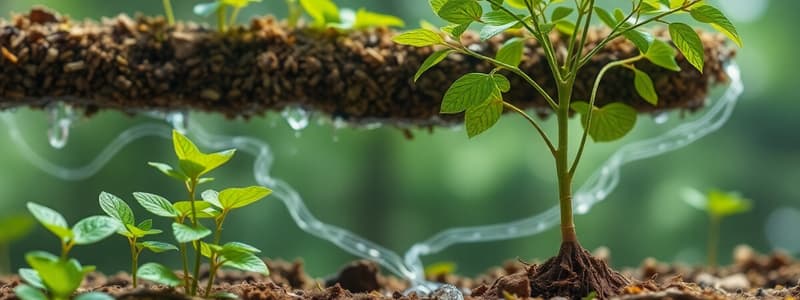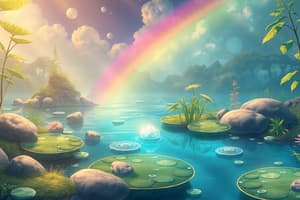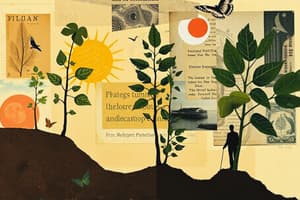Podcast
Questions and Answers
What term describes organisms that produce their own food?
What term describes organisms that produce their own food?
- Scavengers
- Decomposers
- Heterotrophs
- Autotrophs (correct)
Which molecule is essential for living things to harvest energy from matter?
Which molecule is essential for living things to harvest energy from matter?
- ATP (correct)
- Oxygen
- NADH
- Glucose
What happens to organisms if they do not have enough free energy?
What happens to organisms if they do not have enough free energy?
- They grow larger quickly
- They become more active
- They go hungry and waste away (correct)
- They sleep more
During which process do organisms break down carbohydrates to harvest energy?
During which process do organisms break down carbohydrates to harvest energy?
What effect would the removal of all producers from an ecosystem likely have?
What effect would the removal of all producers from an ecosystem likely have?
Which term refers to organisms that depend on others for their energy?
Which term refers to organisms that depend on others for their energy?
What biological process is primarily responsible for producing ATP from sugar molecules?
What biological process is primarily responsible for producing ATP from sugar molecules?
What is the primary source of energy for all living organisms on Earth?
What is the primary source of energy for all living organisms on Earth?
Why is carbon considered one of the most important elements for living organisms?
Why is carbon considered one of the most important elements for living organisms?
Which of the following elements is essential for building proteins and nucleic acids?
Which of the following elements is essential for building proteins and nucleic acids?
What is the role of water in living organisms?
What is the role of water in living organisms?
What happens to the molecular components of a living organism after it dies?
What happens to the molecular components of a living organism after it dies?
What is the significance of phosphorus in living organisms?
What is the significance of phosphorus in living organisms?
Which process is driven by photons from the sun?
Which process is driven by photons from the sun?
What is the main outcome of energy and matter cycling in the environment?
What is the main outcome of energy and matter cycling in the environment?
Flashcards are hidden until you start studying
Study Notes
Energy and Life on Earth
- All life on Earth fundamentally depends on the sun. Sunlight drives photosynthesis in plants, forming the base of most food chains.
- Even meat-eaters indirectly rely on sunlight, as the animals they consume depend on plants or other animals that eat plants.
Matter Exchange in Ecosystems
- Living organisms require free energy and matter for survival. They continuously exchange these with their environment.
- Upon death, organisms decompose, releasing molecules that nourish other life.
- Key elements essential for life include carbon (basis of organic molecules), nitrogen (from the atmosphere, crucial for proteins and nucleic acids), and phosphorus (important for DNA and cell function).
- Water is vital for various bodily functions.
Energy Capture and Storage
- Energy and matter cycle within ecosystems without net loss or gain. However, organisms temporarily store them.
- Plants (autotrophs) produce their own food via photosynthesis.
- Animals (heterotrophs) rely on other organisms for energy.
- Cellular respiration (including glycolysis and the Krebs cycle) breaks down carbohydrates to produce ATP, the energy currency of life.
- Organisms use free energy for functions like growth, reproduction, and maintaining body temperature. Hibernating animals illustrate the need for substantial energy storage.
Impact of Free Energy Changes
- Changes in available free energy affect organisms and ecosystems.
- Individual-level effects include starvation from insufficient energy or weight gain from excess energy.
- Ecosystem-level effects: removal of producers (plants) or reduction in sunlight would severely impact dependent organisms due to decreased energy production. Changes in one trophic level cascade through the entire ecosystem.
Studying That Suits You
Use AI to generate personalized quizzes and flashcards to suit your learning preferences.




